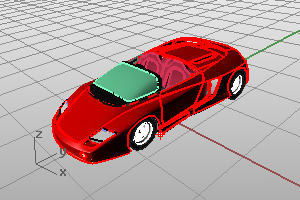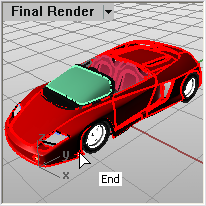View Capture
The View Capture and Screen Capture commands save a bitmap image. The View Capture commands save the contents of the viewport with options for turning on various viewport elements. The Screen Capture commands save the viewport including the viewport frame, viewport title, and the cursor.
|
Toolbar |
Menu |
|---|---|
|
|
View / Viewport title Capture > To File |
The ViewCaptureToFile command saves an image of the current view to a file.
ViewCaptureToFile saves the contents of the view with a specified width and height, disregarding the current viewport size.
Viewport borders, cursor images, and other decorations are not saved.
Steps
- Choose options.
- Choose the location, file type, and name for the bitmap file.
BMP, JPG, PNG and TIFF formats are supported.
- The image saved is automatically given a name with the current date, time, and a custom prefix. Use the Autoname option in the -scriptable command, -ViewCaptureToFile, to customize the prefix. Type two double quotes ("") to remove the prefix.
- The captured images apply the DPI setting from rendering settings.
View Capture Settings
View
A list of the viewports and a preview image.
Options
Select which viewport elements should be captured.
Grid
The grid appears in the captured image.
World axes
The world axis icon appears in the captured image.
CPlane axes
The construction plane axes appear in the captured image.
Transparent background (png and tiff formats only)
Saves the background with alpha channel.
-
When enabled, .jpg and .bmp formats will not show in the Save dialog.
-
If the captured viewport has a transparent background, this checkbox is enabled and cannot be disabled.
Resolution
These settings control output resolution and size.
Resolution
Use the selected viewport screen resolution or choose from a list of presets.
Lock viewport aspect ratio
When this is checked, setting custom resolution numbers below will always be forced to conform to the selected viewport aspect ratio. Set resolution to Custom in the resolution drop down list to enable this checkbox.
Size
Sets the size of the output image using the chosen units.
Size units
Choose the output image size units. Pixels is the default unit.
Scale
Sets the image resolution as a factor of the Size setting.
Resolution
Displays the dots per inch in the output image. This affects the printed size of the image on paper.
Number of passes (Raytraced viewport only)
Set the number of passes for the raytracing to complete before the view is captured.
|
Toolbar |
Menu |
|---|---|
|
|
View / Viewport title Capture > To Clipboard |
The ViewCaptureToClipboard command saves an image of the current view to the Clipboard.
View Capture Settings
View
A list of the viewports and a preview image.
Options
Select which viewport elements should be captured.
Grid
The grid appears in the captured image.
World axes
The world axis icon appears in the captured image.
CPlane axes
The construction plane axes appear in the captured image.
Transparent background
Saves the background with alpha channel to the clipboard. When pasting the image in other APPs, the alpha channel may not be preserved.
Resolution
These settings control output resolution and size.
Resolution
Use the selected viewport screen resolution or choose from a list of presets.
Lock viewport aspect ratio
When this is checked, setting custom resolution numbers below will always be forced to conform to the selected viewport aspect ratio. Set resolution to Custom in the resolution drop down list to enable this checkbox.
Size
Sets the size of the output image using the chosen units.
Size units
Choose the output image size units. Pixels is the default unit.
Scale
Sets the image resolution as a factor of the Size setting.
Resolution
Displays the dots per inch in the output image. This affects the printed size of the image on paper.
Number of passes (Raytraced viewport only)
Set the number of passes for the raytracing to complete before the view is captured.
| Toolbar | Menu |
|---|---|
|
|
|
The ScreenCaptureToFile command saves an image of the current viewport with viewport borders, viewport titles, cursor images, and other decorations as a bitmap file, using the current viewport size.
Screen captures are useful if you are creating illustrations for documentation. With Rhino you can capture the current viewport to the Clipboard, to a file with a color depth to match your current settings.
Steps
- Choose the location, file type, and name for the bitmap file.
BMP, JPG, PCX, PNG, TIFF, and TGA formats are supported.
| Toolbar | Menu |
|---|---|
|
|
|
The ScreenCaptureToClipboard command saves an image of the current viewport with borders and viewport titles to the Clipboard.
The active viewport is captured to the Clipboard as a bitmap. You can paste this image into a paint program for further editing, or another program that accepts bitmap images.
